Kremlin propagandists fuel anti-government sentiment in Armenia
Russian media and influencers blame Armenian prime minister and the West for the situation in Nagorno-Karabakh while encouraging anti-government protests
Kremlin propagandists fuel anti-government sentiment in Armenia
Share this story
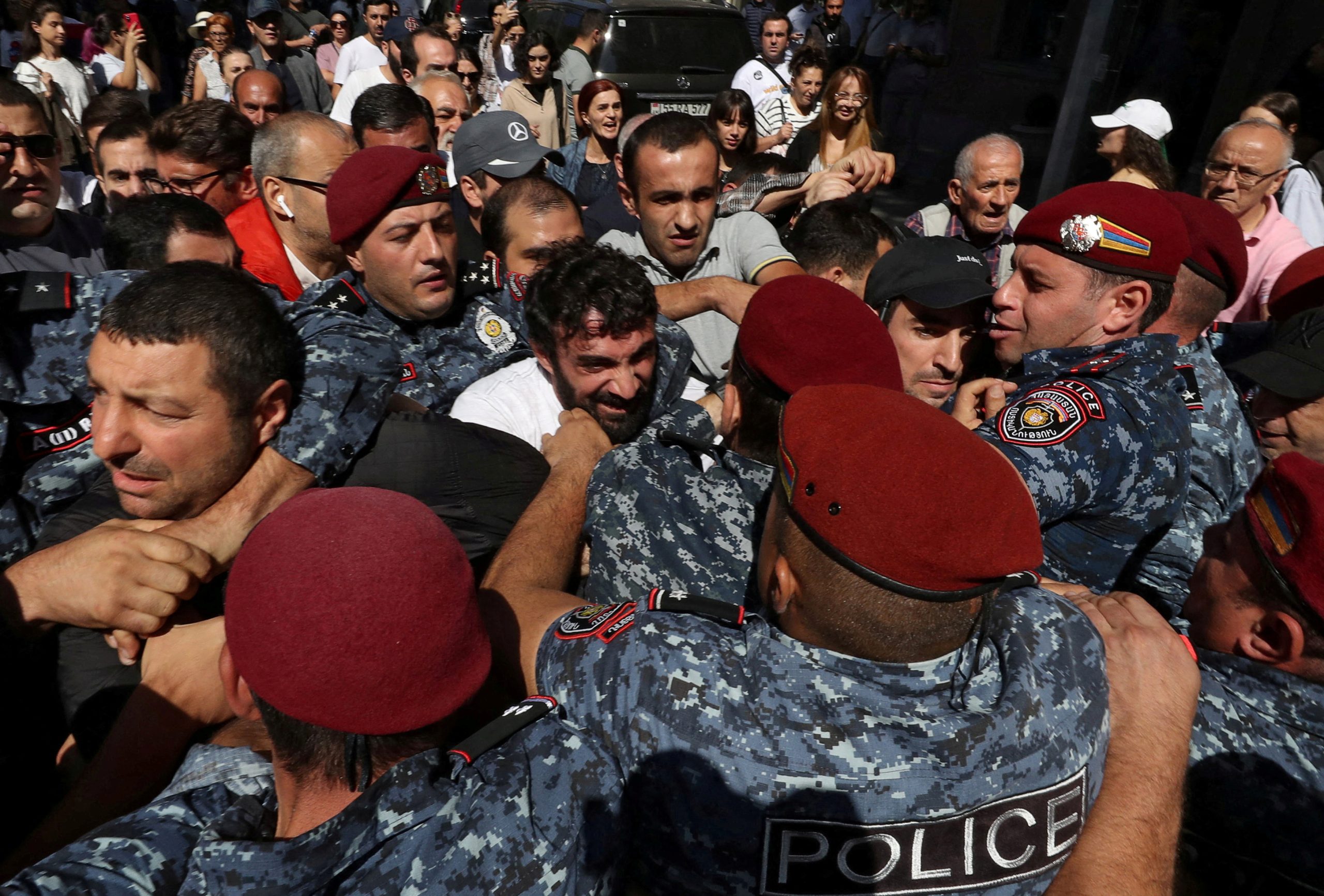
BANNER: Protesters scuffle with police during a rally to demand the resignation of Armenian Prime Minister Nikol Pashinyan in Yerevan, Armenia, September 22, 2023. (Source: Vahram Baghdasaryan/Photolure via Reuters)
On September 19, 2023, Azerbaijan launched an attack on Nagorno-Karabakh after ten months of continued blockade and seized complete control of the disputed region, populated by 120,000 ethnic Armenians. Karabakh local authorities agreed to a ceasefire after twenty-four hours of continuous fighting. On September 24, Azerbaijan and Nagorno-Karabakh’s de facto government agreed on Russia-escorted evacuations after Azerbaijan opened the Lachin corridor for refugees to flee the region. More than 100,000 people have been displaced at the time of writing.
Russia’s relations with Armenia have been deteriorating for years, reaching their nadir with Armenia’s loss of Nagorno-Karabakh. On September 3, Prime Minister Nikol Pashinyan criticized Russia’s lack of assistance and emphasized the need to diversify its security arrangements.
The DFRlab analyzed how Kremlin officials and Kremlin-controlled media framed the situation in Nagorno-Karabakh and Armenia-Russia relations more broadly. Kremlin propagandists pushed three main messages: (1) Pashinyan “ceded” Karabakh to Azerbaijan; (2) The West has an interest in destabilizing Armenia; and (3) Russia is a peacekeeping force. Meduza observed similar narratives in a September 20 report which alleged that Russian media received instructions on reporting on the Nagorno-Karabakh situation. According to Meduza, these instructions revolved around two primary messages: both Pashinyan and the West are to be held responsible for the situation, and Russian peacekeepers are defenders of Karabakh Armenians.
Narrative 1: Pashinyan ceded Nagorno-Karabakh to Azerbaijan
On September 25, 2023, the Ministry of Foreign Affairs of the Russian Federation issued a statement alleging that Armenian Prime Minister Pashinyan was attempting to deflect responsibility for domestic and foreign policy failures by blaming Moscow. The ministry further asserted that Western powers aimed to destabilize “common Eurasian space” and that Armenia’s current government is causing harm to its nation. The statement also said that Pashinyan had acknowledged Azerbaijan’s sovereignty over Nagorno-Karabakh, implying that he had yielded to Western pressure rather than adhering to the “gentlemen’s agreement,” which had envisioned that future generations would determine Nagorno-Karabakh’s fate. Kremlin media asserted that the situation escalated because Pashinyan had purportedly ceded Karabakh to Azerbaijan and recognized Azerbaijan’s sovereignty over the region back in 2020. For instance, Russian propaganda outlet Tsargrad TV disseminated a statement from Russian Foreign Minister Sergei Lavrov in which he “reminded” his audience that Russia was not accountable for the existing situation, emphasizing that the prime minister of Armenia must independently assume full responsibility.
These claims represent part of the Kremlin’s efforts to deflect responsibility from its own role in the crisis, placing blame instead on Pashinyan. In May 2023, Pashinyan expressed a willingness to recognize Azerbaijan’s territorial integrity under “international guarantees” to protect the rights and security of Karabakh Armenians. However, no formal agreement was reached, and negotiations stalled. Prior to that, the 2020 trilateral statement brokered by Russia included provisions for deploying Russian peacekeepers for five years. Their primary responsibility was to protect the Lachin corridor, a crucial link between Armenia and Nagorno-Karabakh. The presence of Russian peacekeepers, however, failed to mitigate a humanitarian crisis in Nagorno-Karabakh following a blockade of the Lachin corridor by self-proclaimed Azerbaijani environmental activists in December 2022.
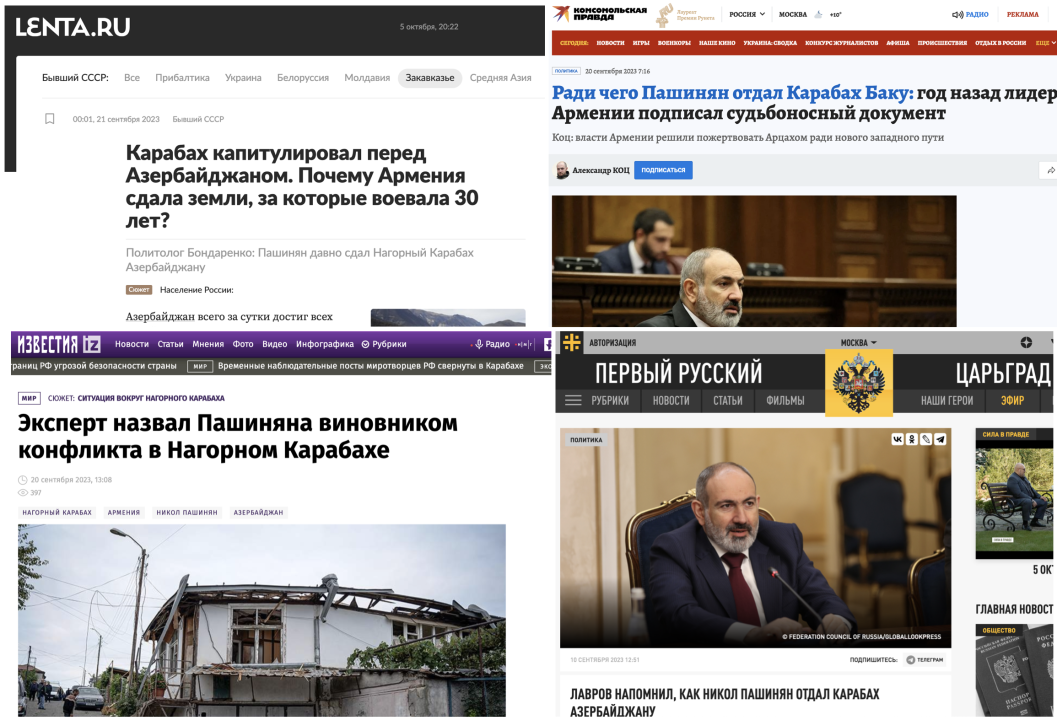
Narrative 2: The West has an interest in destabilizing Armenia
Russian officials and Kremlin-controlled media also promoted the narrative that the West sought to destabilize Armenia. They claimed that Pashinyan had opted for closer relations with the West while severing ties with Russia.
On September 19, Dmitry Medvedev, Russia’s former president and current deputy chairman of the security council of Russia, said in a Telegram post, “Then [Pashinyan] decided to blame Russia for his mediocre defeat. Then he gave up part of the territory of his country. Then he decided to flirt with NATO, and his wife defiantly went to our enemies with cookies. Guess what fate awaits him…” The post referenced Armenia’s joint military drills with the United States, as well as Pashinyan’s wife, Anna Hakobyan, participating in a humanitarian visit to Ukraine. Medvedev’s Telegram post had 2.7 million views at the time of writing, and was forwarded to more than 600 Telegram channels and groups, including a channel operated by Vladimir Soloviev, a sanctioned Kremlin propagandist.
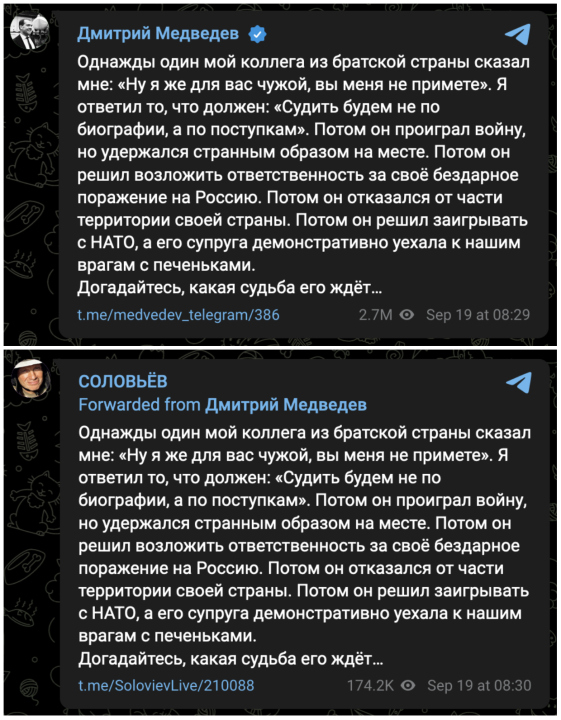
In another example, Komsomolskaya Pravda published an article on September 19 that asserted, “The Armenian military is currently preoccupied with maneuvers alongside the Americans, leaving them with no time to address the situation in Karabakh.” Furthermore, the author of the article on the outlet’s Telegram channel laid blame on the “Anglo-Saxons” for exacerbating the situation in Nagorno-Karabakh, accusing the West of threatening another conflict and the opening of a “second front.” Another Kremlin propaganda outlet, Oktagon, declared that the West had put Armenia on the same track as Ukraine – what it referred to as the “Ukrainization rails” – an insinuated threat given Russia’s ongoing invasion of Ukraine.
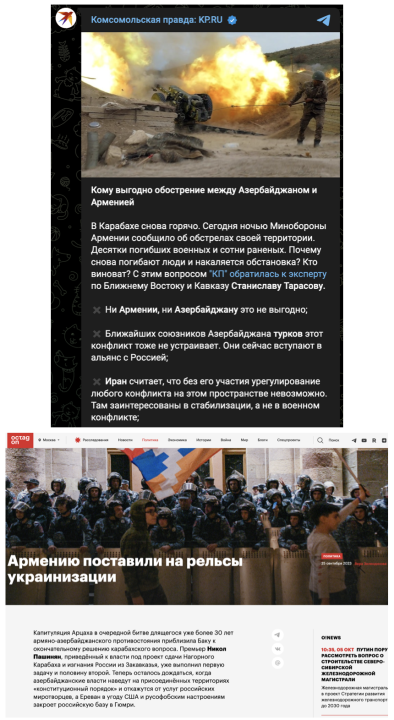
Along these lines, Russia also warned Pashinyan against making “big mistakes.” The Russian foreign ministry said that Russia is convinced that Armenia’s leadership is deliberately trying to destroy the relationship between the two countries and is making Armenia “hostage to geopolitical games of the West,” it stated.
Narrative 3: Russian peacekeepers ensure peace in Nagorno-Karabakh
Following Pashinyan’s open criticism of Russia as a reliable security guarantor in the region, Kremlin-controlled and pro-Kremlin media began emphasizing Russia’s role as peacekeepers in Nagorno-Karabakh. Armenia is a member of the Collective Security Treaty Organization (CSTO), a Russia-led group of six former-Soviet republics committed to protecting its members in the event of an attack.
In a televised address, Pashinyan said that current foreign security alliances were “ineffective” and “insufficient,” whereas Kremlin media propagated the message that Russian peacekeepers were aiding Armenians in Nagorno-Karabakh and that their presence had prevented further bloodshed. For instance, the Russian propaganda outlet Vzglyad published an interview with a Russian expert who asserted that the West had sent a “landing force” of politicians and experts to protect the prime minister of Armenia from protesters in Yerevan, while Russian peacekeepers, at risk to their own lives, were aiding Armenians in Nagorno-Karabakh, which Pashinyan had supposedly betrayed.
Praise for Russian peacekeepers in Nagorno-Karabakh also propagated on Telegram. On September 24, the Russian Ministry of Defense published a video with the caption, “Civilians of Nagorno-Karabakh thank Russian peacekeepers for their help” (“Мирные жители Нагорного Карабаха благодарят российских миротворцев за помощь”). The video garnered more than 100,000 views and was also shared as original content with varying captions in other Telegram channels, including those of RT in Russian, Soloviev, and ANNA news.

Encouraging Armenians to join anti-government protests
At the height of public unrest in Armenia, pro-Kremlin actors on Telegram fueled public rage by spreading misinformation and calls to topple the government. For example, pro-Russian blogger Mika Badalyan claimed on September 20 that Pashinyan would not let refugees from Nagorno-Karabakh enter Armenia. “One of the conditions of Armenia’s surrender of Artsakh [the Armenian name for Nagorno-Karabakh] was not providing the residents of Artsakh with a corridor to Armenia,” he wrote.
The following day, Pashinyan said that Armenia was ready to accept refugees and hit back at Russia’s rhetorical attacks, asking pointedly, “I’m sorry, if the peacekeepers could agree on a ceasefire, why couldn’t they agree before the attack so as to prevent the attack on Nagorno Karabakh? After all, everyone was raising the alarm about it, and we were also saying that Nagorno-Karabakh is surrounded by Azerbaijani military equipment. Why was this mediating activity not done then? These are questions that need to be answered.” The first group of refugees arrived in Armenia on September 24.
In his September 20 post, Badalyan also suggested that Armenia should have gone to war to prevent Azerbaijan’s takeover of Nagorno-Karabakh, and encouraged protests against the government. “It is important to understand that every person who does not come to Republic Square [in central Yerevan] today will be an accomplice not only of the surrender of Artsakh, but also of the Artsakh Armenian Genocide,” he said. Badalyan was briefly detained five days later alongside hundreds of other protesters demanding Pashinyan’s resignation.
Badalyan’s September 20 post garnered one million views on Telegram and was shared more than 13,000 times. Kremlin propagandist Margarita Simonyan, editor-in-chief of Russian state outlet RT, amplified the post, as did Kremlin propagandist Vladimir Soloviev. Armenia has banned Simonyan from entering the country.
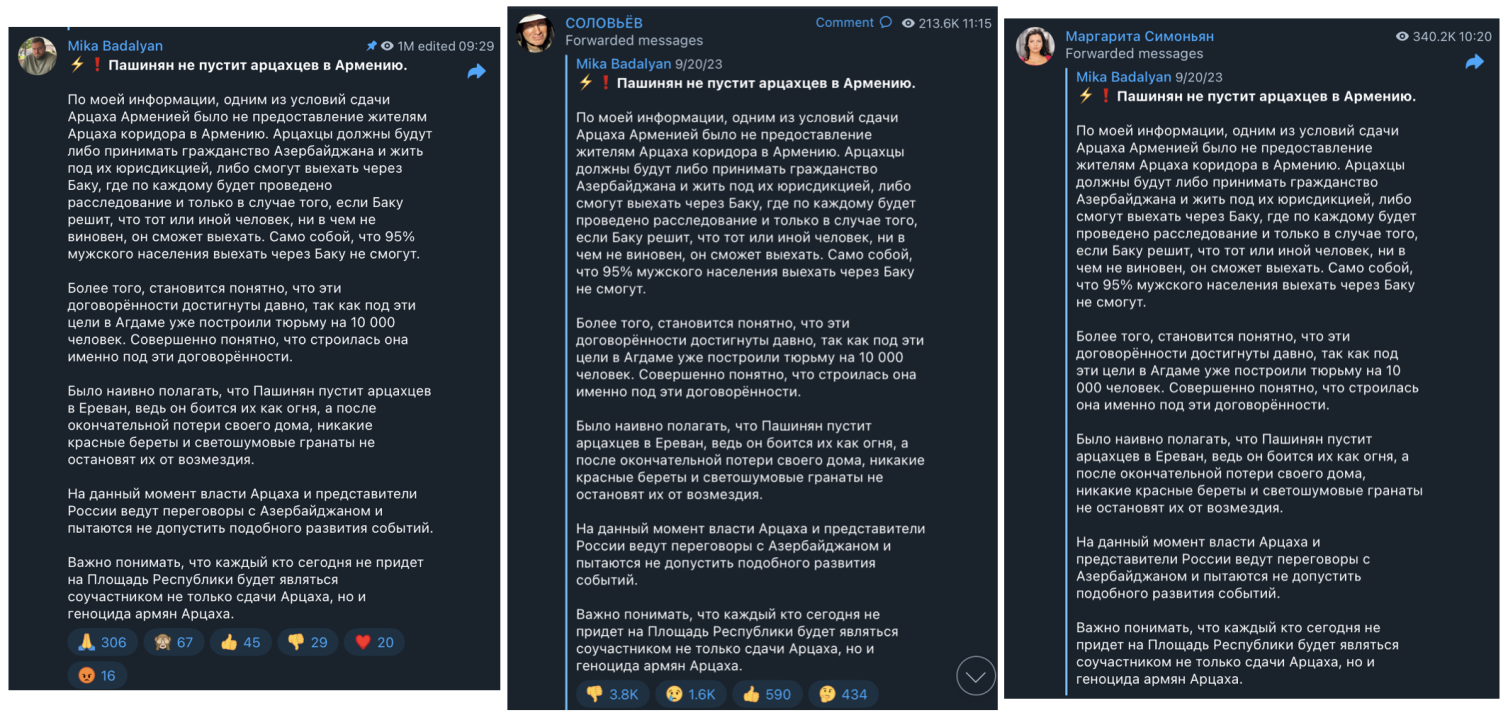
On September 21, the protests grew more violent. X account War Gonzo and its associated Telegram channel posted a video from the protest with a caption claiming the rally organizers supposedly received a “signal from the Kremlin.” He stated, “The rally in Yerevan is gaining momentum. Rallies organized by the pro-Russian opposition, which received a signal from the Kremlin, continue in Yerevan. Hundreds of people march through the streets towards the city center, chanting anti-government slogans.”
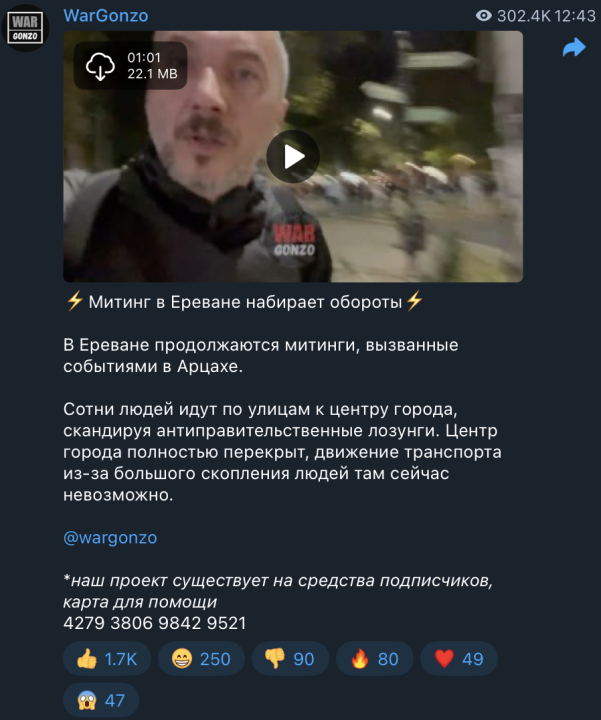
The Telegram channel Markarov’s Logic (Логика Маркова), which is operated by former Putin adviser Sergei Markov, wrote that protests were “sluggish” in Yerevan and that the opposition – it was unclear who specifically – was more concerned with explaining how they spent the country’s resources than “removing the traitor Pashinyan.”
Pro-Kremlin messaging about Nagorno-Karabakh has not prevented Armenia from asserting its political independence. On October 3, the Armenian parliament ratified the Rome Statute. As noted by the Associated Press, “Countries that have signed and ratified the Rome Statute that created the ICC are bound to arrest Putin,” given that the Russian president faces charges at the International Criminal Court for possible war crimes in Ukraine.
Cite this case study:
Ani Mejlumyan and Sopo Gelava, “Kremlin propagandists fuel anti-government sentiment in Armenia,” Digital Forensic Research Lab (DFRLab), October 5, 2023, https://dfrlab.org/2023/10/05/kremlin-propagandists-fuel-anti-government-sentiment-in-armenia/.

